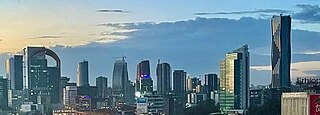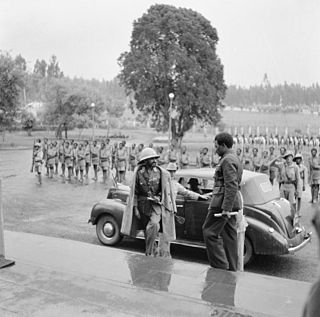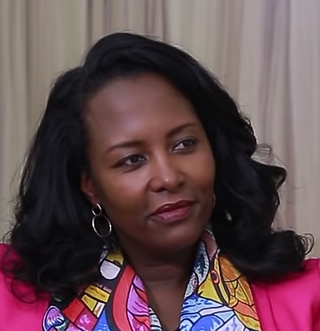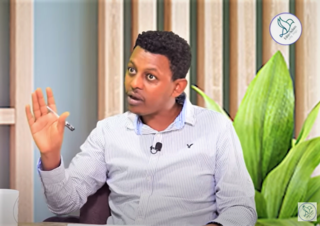
Addis Ababa is the capital and largest city of Ethiopia. In the 2007 census, the city's population was estimated to be 2,739,551 inhabitants. Addis Ababa is a highly developed and important cultural, artistic, financial and administrative centre of Ethiopia.

Addis Ababa University (AAU) is a national university located in Addis Ababa, Ethiopia. It is the oldest university in Ethiopia. AAU has thirteen campuses. Twelve of these are situated in Addis Ababa, and one is located in Bishoftu, about 45 kilometres (28 mi) away. AAU has several associated research institutions including the Institute of Ethiopian Studies. The Ministry of Education admits qualified students to AAU based on their score on the Ethiopian University Entrance Examination (EUEE).

According to the U.S. Department of State's human rights report for 2022, there exists "significant human rights issues" in Ethiopia. In addition to extrajudicial killings and instances of "enforced disappearance", other human right issues in Ethiopia include arbitrary arrest, the censorship and unjustified arrests of journalists, the use of child soldiers, and more.

Law enforcement in Ethiopia is dealt with by the Ethiopian Federal Police at federal level and by regional police commissions in the Regions of Ethiopia. The Ethiopian Federal Police (EFP) was established in 1995 to serve the public, to ensure the observation of human and democratic rights and to maintain the safety and welfare of the public. Its stated duties are the enforcement of laws and safeguarding constitutional guarantees, the prevention, detection and investigation of crime, the coordination of national state police commissions and development of national policing standards. The EFP also has to provide operational support to regional police commissions.
However, local militias also provide local security largely independent of the police and the Ethiopian military. Corruption is a perennial problem, particularly among traffic police who solicited bribes.
The U.S. Department of State states that its contacts within the Ethiopian government report that the findings of investigations into abuses by local security forces, such as arbitrary detentions and beatings of civilians, are rarely made public. However, the Ethiopian government continued its efforts to train police and army recruits in human rights. During 2008 the government was seeking assistance from the International Committee of the Red Cross, the local non-governmental organization Prison Fellowship Ethiopia (JFA-PFE), and the Ethiopian Human Rights Commission to improve and professionalize its human rights training and curriculum. The JFA-PFE provided human rights training for police commissioners and members of the militia in 2008.

The history of Addis Ababa, capital of Ethiopia, formally begins with the founding of the city in the 19th century by Ethiopian Emperor Menelik II and his wife Empress Taytu Betul. In the Middle Ages, Addis Ababa depicted as a fortified city named "Barara", and served as residence of Emperor of Ethiopian Empire until Dawit II. It was totally plundered by Adalite general Ahmed Gran in 1529, at the onset of Ethiopian–Adal War.

Ethiopia–United States relations are bilateral relations between Ethiopia and the United States. Ethiopia is a strategic partner of the United States in the Global War on Terrorism. The United States is the largest donor to Ethiopia: in 2008 U.S. foreign aid to Ethiopia totaled US$969 million, in 2009 $916 million, with 2010 estimated at $513 million and $586 million requested for 2011. U.S. development assistance to Ethiopia is focused on reducing poverty and supporting economic development emphasizes economic, governance, and social sector policy reforms. Some military training funds, including training in such issues as the laws of war and observance of human rights, also are provided.

Abune Merkorios was an Ethiopian bishop and the fourth Patriarch of the Ethiopian Orthodox Tewahedo Church, elected after the death of Abuna Takla Haymanot in May 1988. Merkorios remained Patriarch for three years until 1991, when the Ethiopian People's Revolutionary Democratic Front (EPRDF) overthrew the Communist military junta known as Derg in Addis Ababa. After spending almost three decades living in exile, he was allowed to return to Addis Ababa and be recognized as Patriarch alongside Abune Mathias.
The National Palace, formerly Jubilee Palace, is a palace in Addis Ababa, Ethiopia. It is an official residence of President of Ethiopia since the Derg government.

Abiy Ahmed Ali is an Ethiopian politician serving as the third Prime Minister of Ethiopia since 2018, and as a leader of the Prosperity Party since 2019. He was awarded the 2019 Nobel Peace Prize "for his efforts to achieve peace and international cooperation, and in particular for his decisive initiative to resolve the border conflict with neighbouring Eritrea". Abiy served as the third chairman of the Ethiopian People's Revolutionary Democratic Front (EPRDF) that governed Ethiopia for 28 years and the first person of Oromo descent to hold that position. Abiy is a member of the Ethiopian parliament, and was a member of the Oromo Democratic Party (ODP), one of the then four coalition parties of the EPRDF, until its rule ceased in 2019 and he formed his own party, the Prosperity Party.

Adanech Abebe is an Ethiopian politician and attorney who is serving as the thirty-second mayor of Addis Ababa since 2021. She has been serving as a deputy mayor from 2020 until 2021. She previously was the Minister of Revenue and Customs Authority from 2018 to 2020, when she became the first female to assume the role of the Federal Attorney General of Ethiopia. She is the first woman to hold the mayorship since it was created in 1910.

Ethnic discrimination in Ethiopia during and since the Haile Selassie epoch has been described using terms including "racism", "ethnification", "ethnic identification, ethnic hatred, ethnicization", and "ethnic profiling". During the Haile Selassie period, Amhara elites perceived the southern minority languages as an obstacle to the development of an Ethiopian national identity. Ethnic discrimination occurred during the Haile Selassie and Mengistu Haile Mariam epochs against Hararis, Afars, Tigrayans, Eritreans, Somalis and Oromos. Ethnic federalism was implemented by Tigray People's Liberation Front (TPLF) leader Meles Zenawi and discrimination against Amharas, Ogaden, Oromos and other ethnic groups continued during TPLF rule. Liberalisation of the media after Abiy Ahmed became prime minister in 2018 led to strengthening of media diversity and strengthening of ethnically focussed hate speech. Ethnic profiling targeting Tigrayans occurred during the Tigray War that started in November 2020.
The 1995 Ethiopian Federal Constitution formalizes an ethnic federalism law aimed at undermining long-standing ethnic imperial rule, reducing ethnic tensions, promoting regional autonomy, and upholding unqualified rights to self-determination and secession in a state with more than 80 different ethnic groups. But the constitution is divisive, both among Ethiopian nationalists who believe it undermines centralized authority and fuels interethnic conflict, and among ethnic federalists who fear that the development of its vague components could lead to authoritarian centralization or even the maintenance of minority ethnic hegemony. Parliamentary elections since 1995 have taken place every five years since enactment. All but one of these have resulted in government by members of the Ethiopian People's Revolutionary Democratic Front (EPRDF) political coalition, under three prime ministers. The EPRDF was under the effective control of the Tigray People's Liberation Front (TPLF), which represents a small ethnic minority. In 2019 the EPRDF, under Abiy, was dissolved and he inaugurated the pan-ethnic Prosperity Party which won the 2021 Ethiopian Election, returning him as prime minister. But both political entities were different kinds of responses to the ongoing tension between constitutional ethnic federalism and the Ethiopian state's authority. Over the same period, and all administrations, a range of major conflicts with ethnic roots have occurred or continued, and the press and availability of information have been controlled. There has also been dramatic economic growth and liberalization, which has itself been attributed to, and used to justify, authoritarian state policy.

Since the new constitution of Ethiopia enacted in 1995, Ethiopia's legal system consisted of federal law with bicameral legislature. The House of People's Representatives (HoPR) is the lower chamber of bicameral legislature of Federal Parliamentary Assembly with 547 seats and the House of Federation with 108 seats, the former vested on executive power of Prime Minister and the Council of Ministers, and the latter have authority to interpret federal law and oversees regional and federal decisions.

The judiciary of Ethiopia consists of dual system with parallel court structures: the federal and state courts having independent administration. The FDRE Constitution vested federal authority to the Federal Supreme Court which is cassation division and presides determining and overturning decisions made by the lower federal courts with itself has regular division assigned to review fundamental errors of law. Article 3, 4 and 5 stipulates the governance of federal courts over national and international aspects.

The Ethiopian Federal Police is the law enforcement agency of the Federal Democratic Republic of Ethiopia. Established in 1995, the agency aims with objectives of maintaining or safeguarding the public security, human and democratic rights, and respecting constitutional law.
Democratic backsliding in Ethiopia is ongoing, most notably under the administration of Prime Minister Abiy Ahmed. Since assumption of power in April 2018, Ahmed has played crucial role of reforms in the Ethiopian politics and reversal of policies implemented by the former ruling party, the Ethiopian People's Revolutionary Democratic Front (EPRDF). Abiy immediately gained public approval and international recognition owing to liberalized policymaking including in media outlets, gender equality, internet freedom and privatization of economy. Furtherly, he was also warmly gained accolades for ending 20-years conflict between Ethiopia and Eritrea, from which he awarded the 2019 Nobel Peace Prize, being the first Ethiopian to earn the title. In 2019, Ethiopia received a score of 19 out of 100 in the Freedom in the World metric, a significant improvement from previous years, although it is still characterized as "Not Free". In December 2019, he formed the Prosperity Party by dissolution of EPRDF and merged all its ethnic based regional parties while the Tigray People's Liberation Front (TPLF) refused to obey, resulting intense face-off with the federal government. He promised to hold free and fair upcoming election; although due to COVID-19 pandemic deterioration and other security and logistics issues, the election was postponed indefinitely in mid-2020. Opponents called this action as backdrop to "reconsolidate dictatorship" and "constitutional crisis". On 9 September 2020, the Tigray Regional election were held as the federal government deemed illegal election. According to the electoral commission, the TPLF won 98.2% of 152 seats were contested. The federal government and the Tigray authority relations aggravated by late 2020, culminating the Tigray War.

Crime in Ethiopia includes various techniques ranging from petty theft to homicide. Motivations of crime include high unemployment rate, lack of basic needs of life, housing and education. Rapid population growth also contributed to increase the criminal rate in Ethiopia. In Addis Ababa, crimes include robbery, pickpocketing, scamming and burglary among others are common, although the lowest rate compared to other African cities and within the country.

The Addis Ababa Federal Police is the law enforcement division of the Ethiopian Federal Police in Addis Ababa city administration. Established in 2003 by Proclamation of Council of Ministers No.96/2003, it has the main duty of safeguard public security and peace and comply to the Constitution and the law of the country by preventing crimes. It is administered by the Addis Ababa City Administration Police Commission, which is responsible to the Federal Police Commission of Ethiopia.

The banking sector of Ethiopia composed of the central bank, the National Bank of Ethiopia (NBE), which is state owned and sixteen private banks. By 2020, the NBE planned to increase the minimum capital for banks to operate to 2 billion birr and instructed all commercial banks to increase their capital. Foreign banks did not allow to provide service in Ethiopia, instead use medium term as the government of Prime Minister Abiy Ahmed pursues wide economic reforms.

Political repression is a visible scenario under the leadership of Prime Minister Abiy Ahmed after 2018, characterized by severe human rights violation, restriction of press, speeches, dissents, activism and journalism that are critical to his government. Similar to TPLF-led EPRDF regime, there was a raise of censorship in the country, particularly internet shutdowns under the context of anti-terror legislation labelling them "disinformation and war narratives" since the raise of armed conflict in Ethiopia. In June 2018, Abiy unblocked 64 internet access that include blogs and news outlets.
















